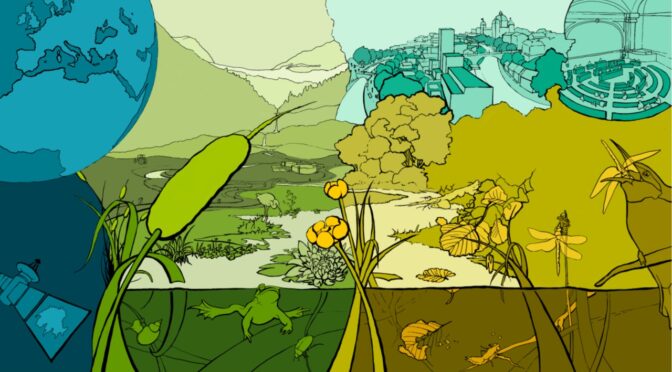
Are you interested in how systems thinking and design for social change is done and how this can have an impact in policymaking?
If yes, join our upcoming science and policy workshop.
Continue reading New Course Offer – Systems Thinking and Design for Social Change and in Policymaking →

Are you interested in biodiversity management and conservation at the global, national, cantonal, and municipal level? Are you interested in how integrating scientific research results into the decision-making process and engaging at the science and policy interface successfully? If yes, join our upcoming science and policy workshop.
Continue reading New Course Offer – Capacity Building Workshop on Effective Science-Policy Collaboration in Biodiversity Management →

In this report, we summarize the efforts to reduce GHG emissions in the community catering of three Swiss universities: University of Zurich, Eidgenössische Technische Hochschule Zurich and University of Basel. We present possible interventions and policies implemented in the canteens and discuss the impacts of these interventions in the institutional environments. Finally, we arrive at some recommendations for further action.
García Rosa, A.V., Scharte, M., Paschke, M. (2023). Improving sustainability through canteen policies and interventions at three Swiss universities: ETH Zurich, University of Zurich and University of Basel. Download the report (PDF)
Continue reading Improving sustainability through canteen policies and interventions at three Swiss universities →

How do scientific insights find their way into parliament? Researchers in Switzerland often do not have a clear answer to this question. A new publication by the Swiss Young Academy provides practical tips, insights and background information on the legislative process. This orientation guide is intended to enable (young) scientists to successfully contribute their knowledge to parliamentary deliberations.
Continue reading Who gets heard? Scientific experts at the Parliament →

Der Bundesrat wurde vom Parlament beauftragt, bis Mitte 2024 risikobasierte Regeln für die Zulassung von Nutzpflanzen vorzulegen, die mit neuen Züchtungsmethoden gezüchtet wurden, kein artfremdes Erbmaterial enthalten und einen Mehrwert für Landwirtschaft, Umwelt und Konsumierende gegenüber herkömmlichen Züchtungsmethoden bieten. Die Vernehmlassung der vorgeschlagenen Zulassungsregelung ist für die 2. Jahreshälfte 2023 angekündigt. Als Beitrag zur Diskussion hat das Forum Genforschung der SCNAT untersucht, ob sich aktuell Projekte in Forschung und Entwicklung befinden, die diesen Kriterien entsprechen.
Continue reading Neue Züchtungstechnologien: Anwendungsbeispiele aus der Pflanzenforschung →

Die Stiftung wissenschaftliche Politikstipendien vergibt per September 2023 zwei Politikstipendien für junge Wissenschaftlerinnen oder Wissenschaftler. Die Stipendien ermöglichen Abgängerinnen und Abgängern von Schweizer Hochschulen aller Fachbereiche und Disziplinen, die politischen Prozesse im Schweizer Parlament kennenzulernen. Für ein Jahr unterstützen Sie die Arbeit der Parlamentsdienste im Bundeshaus in Bern. Die Bewerbungsfrist läuft bis zum 13. März 2023.
Mehr Informationen
Ehlers et al. (2020) investigated the extent to which digital technologies can trigger different choices of agricultural policy instruments and novel design specifications that address problems of sustainability in farming more effectively and possibly more efficiently. They developed and applied an analytical framework that focuses on the effects of digitalisation in distinct policy dimensions, drawing on theoretical insights and examples from practice in a European context.
Continue reading How could digitalisation make agricultural policy more effective in reducing undesired impacts and enhancing the benefits of farming? →
Engaging in a Science and Policy Dialogue






